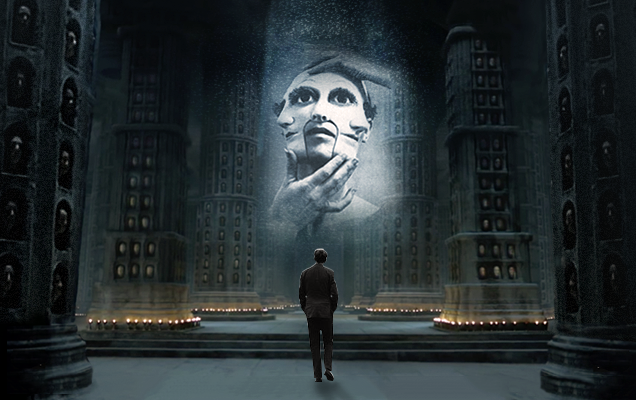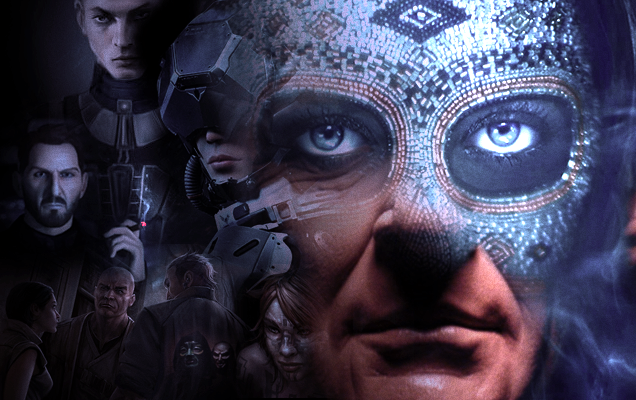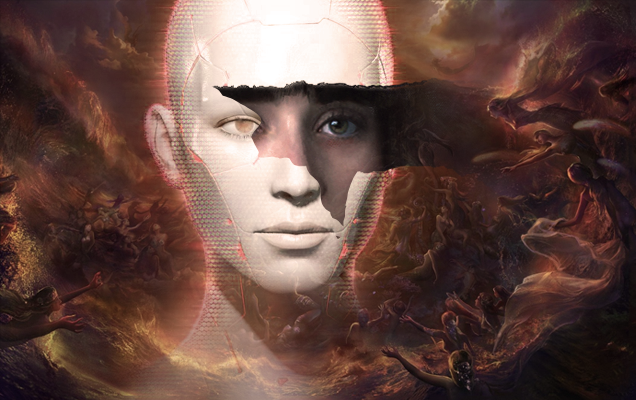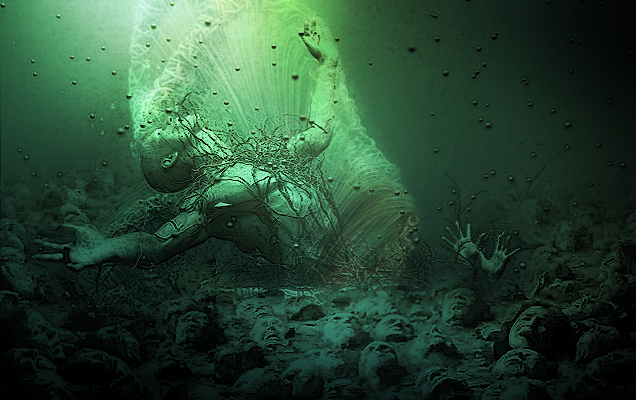It’s been ages since I wrote about Eve Online from the perspective of a player, instead of issuing proclamations full of bombast and demagoguery as the leader of a vast space tribe. From 2009 to 2012, my ‘Sins of a Solar Spymaster’ columns would follow a reassuring format: pose a question, lay out history or arguments around that question, and end with a definitive answer.
Paradoxically, my position as the leader of Goonswarm Federation has steadily eroded any sense of certainty and understanding about the game we play, compared to when I first began. Why do we play? Is this even actually a game? If not, are we really playing, or living out existences in dual realms? Is Eve, to quote the much-mocked CCP ad campaign from 2011, ‘real’? If so, is that a good thing, and what does it say about those of us playing it? Long ago, when I knew less, I had all sorts of easy, quick, and inaccurate answers to these questions which made for great column fodder. I think the reason I stopped writing regularly about Eve is simple: as I learned more about Eve, I ran out of answers, especially to these most fundamental questions.
Everything is Strange in This World
Let’s face facts: Eve Online and its playerbase are anomalies in the world of video games – which is a nice way of saying that we’re playing a tremendously weird game in a tremendously weird way. The average age and demographic makeup of the players (37+ years old, overwhelmingly male, overwhelmingly well-educated) doesn’t resemble any other online game. The sandbox gameplay of Eve doesn’t even vaguely track that of other games; most sandbox games like Second Life are feel-good wish-fulfillment simulators, while Eve is more like nightmare fuel. There is no game with the shardless scale of Eve, no game with half a million rats trapped in one cage without another server to flee to in order to escape their conflicts. There is a whole cadre of academics who are steadily working their way up the tenure track writing papers about what goes on in New Eden.
I watched a clip of a twitch streamer which was making the rounds. Someone asked him what he thought about Eve, and he summed up in a few sentences what has been nagging me for more than a decade: Eve isn’t a game, it’s a lifestyle – or perhaps a cult.

But there’s more going on here than a mere cult. Consider that Eve players agree that ‘winning’ Eve means getting over it and quitting the game forever. Eve players will refer to their real-world names as their ‘slave names’. Eve players seem to meet up in the real world far more than players of other games, and are compelled to talk about their in-game experiences with each other with an unmatched drive and enthusiasm. We are forced to interact with one another in the game, and choose to seek out even our bitter foes to have beers with them.
What the hell is going on here? If your real name is your slave name, why do you win Eve when you quit it forever? Why are we driven to hang out with each other in the real world over Eve, where at-a-distance disposable relationships suffice in other games? And why is it so hard to quit for good, even when we want to?
It is about the roles we choose to play, and what it says about us when we choose them.
Donning the Mask
When new players first encounter Eve, many of them simply turn away, clicking out of the tutorial and never returning. Some, however, stay. They fight through the tutorial and the worst-in-class PvE experience, and if they play the game for longer than six months, statistically speaking those players will continue to play Eve forever – a decade or more. What is it about Eve that makes some players stick, where others are instantly repelled?
Those who stay have chosen a mask to wear – a role for their time in New Eden. This mask sets their path, a set of skills to develop and values to live by which goes beyond their opportunities in the real world. Some players begin wearing a mask immediately, diving in and becoming a pirate from their first hour in the game; others play the game for a while before finding a mask that fits and then committing to the game.

There are a number of identities we can assume when playing Eve that are not safe in the real world; this is one of the game’s primary draws. Come to New Eden and be a spy, a warrior, a diplomat, a pirate, a warlord! In Eve you can safely wear a mask and engage in activities that would get you thrown in jail or killed in reality; a scammer like Scooter McCabe would be a criminal instead of a folk hero, and being a warlord – like a nullsec alliance leader – only works in failed states like Somalia or in a criminal enterprise.
The key thing is this: until we are done wearing these masks, as long as we desire the experience from this other identity, we are engaged with one another in a sci-fi themed masquerade ball along with hundreds of thousands of others wearing their own masks – with all the ups and downs inherent in such events.
Hell Is Other People
However, the freedom to wear a mask comes with a price; you can choose your mask, change your mask, and swap between masks, but you cannot escape other players. The game which allows the most freedom of identity and experience traps us with one another; our masks compete. If I am to get my kicks as a pirate, you as a miner must suffer. If I am to get my kicks as an empire-builder, you as a plucky independent rebel must suffer. Eve promises us heaven – the ability to be who we imagine ourselves to be, to explore other identities, changing them like our clothes – but then gives us hell: the fact that in order to be who we want to be, we must compete with the identities of hundreds of thousands of other identity-seekers.
But the other players and the scale at which Eve operates are key to giving our masks value. You can play Second Life and skin an avatar as a spy or a pirate, but you don’t impact anything; it is more like playing dress-up or writing fan-fiction about yourself. In Eve you can attack, seize, conquer, and test yourself against other people whether they like it or not. When you become a pirate in Eve, you have proven to yourself that you in fact have the capabilities as a person to live up to at least part of the mask: you realize that the mask you chose is no longer entirely a mask, but a reflected aspect of your capabilities and talents as a person.
On the flipside of success, we also have the electronic safety net to fail spectacularly and not die or have our lives ruined; a failed pirate in Eve gets a lossmail and a bruised ego, while an aspiring criminal in the real world may be thrown in jail or even killed. You can test out masks and find hidden skills you never imagined: the sysadmin discovers a talent as a fleet commander, the military veteran discovers she has a knack for market analysis.
This provides the irresistible tension of Eve: by testing yourself against other players striving against you, your victories and failures have meaning and say something about your identity. And victory is addictive; if you succeed in your goals in Eve, you want to keep doing it. Other players will validate your success; you can become known among legions, cementing your sense of real accomplishment through the admiration or enmity of the other. More wars, more heists, more ISK – more conflict with other players who themselves are striving to fulfill their chosen identity. Our successes and our failures can resonate even after we have won the game, inspiring a new generation to take up our masks and mantles; how many thousands of spies began their careers emulating Istvaan Shogaatsu, long after he achieved final victory?
Eve Online is the only world offering this semi-toxic mix of identity, risk, security, and realness – and this is why our desire to be our other, imagined selves, our desire to wear these masks, imprisons us here.

Trapped in Cyber-Purgatory
What is Eve? A galaxy which doesn’t exist in a ‘game’ which resembles a lifestyle, populated with players wearing masks that fulfill deep-seated desires. A universe of social anarchy where no one can be coerced with physical force or the threat of death, where emotional violence is unleashed with impunity. A place which is not quite real, but not quite fake; a place where one can learn new skills, develop and mature as a person – to ascend. But also a place where one can descend – to see human behavior stripped from law and virtue, to find an outlaw tribe where wrong is justified as right. Eve Online is a cyber-Purgatory, a half-realm offering redemption or damnation for those exploring their identities within it. By offering us our choice of masks, Eve can enable us to know ourselves and lift ourselves and our friends up, but also to drag each other down – enabling our darker natures.
This is why Eve players win the game when they quit. We see players gaining confidence in themselves, unlocking talents that are valuable in the real world, making connections and forming real friendships; when they win the game and no longer need their masks, we wish them well and hold them up as success stories. “He won Eve, good for him.” You can always tell who is simply ‘on break’ from Eve but hasn’t actually won; they are not done wearing their mask, and have merely put it on the shelf for a time. We can tell who has won – and we know who will be back.
Saints and Sinners
There are saints and sinners in this Purgatory. We have the Space Pope, Maximilian Singularity VI, the First of His Name: a genuinely good human being who sticks around in this world to bless us and help players in dire need through the Sixth Empire. I don’t know any other game with a Pope; at an intuitive level it seems to make sense that Eve would have a Pope who would bless us, and it doesn’t get questioned much. Of course we have a Pope!
Meanwhile, there are dire examples of those who have fallen and become worse as people. There are scams that go too far, such as the infamous I Am Olivia incident, or the Bonus Room. There are little cliques of racists and bigots who have found each other here and reinforce their evil, leaving 1488 units of gas as references to white supremacy in their lossmails.
Eve exposes its players to the limits of humanity in an unfiltered way. In real life, most people do not personally encounter extremes of behavior unless they choose to work as police, nurses, social workers, or join the military. Yet in this video game, we are confronted with both the best and worst of human nature on a regular basis, and have the opportunity to learn – or become embittered – from that exposure. For some players, their masks become an avenue of liberation, showing a path of hope for a different life path, a different career, and different worldview. For others, their mask become a prison, trapping them within an addictive, unhealthy identity.

In the context of cyber-Purgatory, a player threatening to cut off another players hands seems tame; what would send the World of Warcraft community into a fit of vapors barely raises an eyebrow in New Eden. We eat death threats for breakfast and the bulk of our expressions of outrage are simply concern trolls leveraged to advance our positions in the metagame; today’s torches-and-pitchforks mob is tomorrow’s detached, ironic punchline. Victory in Eve becomes the opportunity to express your chosen identity your way, often at the cost of someone else not being able to express theirs. It’s simply part of the price we pay to explore our potential selves.
No Answers, No Masters
I wish I could end this piece with a tidy conclusion wrapped up in a bow, but humanity is simply too messy for that, and Eve Online is ultimately a realm populated with humans doing human things. Even as we try to label and describe the framework of what is happening in Eve, the situation mutates. Normal video games sanitize human behavior and make it safe, putting limits on what we can and cannot do to one another; Eve Online does not, and so here we are, groping for answers as to what the hell we’re doing, wearing our masks in Purgatory – and wondering why we enjoy it so damn much.

